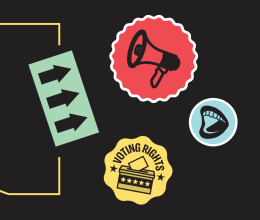Can agents or police enter my workplace without a warrant?
- Immigration agents and police may enter your workplace without a warrant if your employer grants them permission to enter or if your workplace is publicly accessible (e.g., the public areas of a restaurant or a reception area).
- If your employer does not permit them to enter, or if officials seek to enter a non-public area, then the general rule is that they must have a warrant signed by a judge to enter a business.
Can I be detained while the authorities search my workplace?
- If the agents or police have a warrant to search the premises, they may ask you to stay in a particular area to ensure officer safety while the search is being carried out.
- If officers use force, that force must be reasonable under the circumstances.
- Officers may not hold you for the purpose of questioning you after they have completed the search unless they have probable cause to believe you have committed a crime. Mere proximity to the raid or to an undocumented immigrant does not establish probable cause.
What if an agent or officer wants to question me?
- Ask if you are free to go. If the officer says yes, you may leave.
- If the officer says no, you have the right to remain silent and ask to speak to a lawyer before answering any questions.
- Immigration officials are not required to read you your Miranda Rights. Still, you have a right to avoid self-incrimination, even if the officer does not tell you so.
- Be aware that, unlike in the criminal context, courts are permitted to draw adverse inferences based upon your silence.
- If you provide incriminating information to an officer, it can and will be used against you in future legal proceedings.
- You should never provide false information to an immigration agent or officer.
Do I have to tell an agent or officer my name?
You are not required to give your name to federal law enforcement (e.g. ICE). If a local or state police officer who is investigating a crime asks for your name, you are required to state your true full legal name under Arizona law, but you are not required to provide any further information. Be aware that providing your name can carry some risk if you are subject to deportation.
Do I have to answer questions about whether I am a U.S. citizen, where I was born, or other questions about my immigration status?
Regardless of whether you are questioned by a federal agent or state or local police, you have the right not to answer any other questions, including questions about your immigration status. You also have the right to request an attorney to advise you on any disclosures you do or do not wish to make.
What if an agent or officer presses me for information or threatens me?
- During a raid, it is natural to feel scared or intimidated. However, you always retain the right to remain silent and to speak to a lawyer. Immigration law is very complicated, and a lawyer can advise you how to answer and help you avoid a problem.
- Even if you have answered some questions, you can still decide that you do not want to answer any more questions.
- If the agent or officer orders you to do something or threatens to use force, you should comply. Do not get into an argument with an officer, touch any officer, or physically interfere with their search or interrogation.
Do I have to show the agent or officer my immigration documents?
Certain categories of non-U.S. citizens who are 18 or older who have been issued immigration documents are required to always carry those documents.
If an immigration officer requests to see your immigration documents, you are required to show them to the officer. If you are arrested and have valid immigration documents somewhere else, ask someone to bring them to you.
If you say you are not a U.S. citizen and cannot prove that you are in the country legally, there is a good chance you will be arrested. At that point, you still have the right to remain silent.
If you do not have a valid immigration document, do not show the officer fake documents. Do not lie or say you are a U.S. citizen if you are not. Do not carry papers from another country. The government can use all of this information against you.
What should I do if my rights have been violated?
Try to note as much detail about the raid as possible, including officers’ badge numbers, and encourage others to do so as well. If an agent refuses to provide information, you should note that as well.






